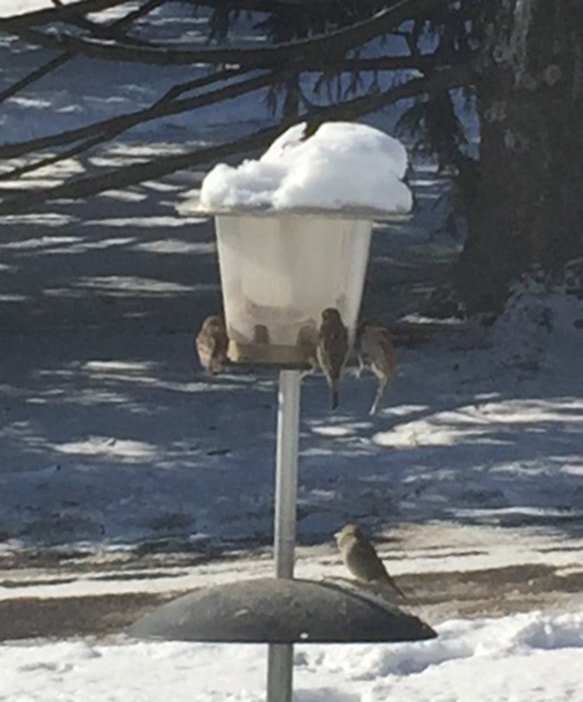 Feeding birds in winter is crucial for their survival. Contributed photo Feeding birds in winter is crucial for their survival. Contributed photo Since Thursday, December 21, marks the first day of winter, it also marks the official start of winter bird feeding season. Winter is when birds need supplemental food sources the most, especially for our year-round bird residents such as black capped chickadees, blue jays and winter visitors like evening and pine grosbeaks. As such, here are some basic bird feeding tips from our Outdoor Wire birding friends. *Make your own feeding mixture to maximize the number of species visiting your bird feeder. Black or oil sunflower seed is the favorite of many birds, but when mixed with thistle (or nyjer) seeds or cracked corn, you’ll be assured to attract a wide variety of species. And don’t forget suet to attract woodpeckers and even chickadees. *Mix up the type of feeders you use. Hopper feeders are great for large birds such as blue jays, while tube feeders are best for smaller birds. Elevated tray feeders will attract birds that are usually ground feeders including juncos and larger birds such as evening grosbeaks. Of course, you’ll also have to contend with squirrels who are habitual feeder robbers. You may also want to add a water source like a bird bath or simple tray but you’ll need to invest in a heated that can be purchased at local hardware or birding stores. *If possible, place feeders near natural habitat or add a habitat for birds to hide. A Christmas tree is a great addition to a backyard. Instead of throwing out your real Christmas tree when Christmas is over, put it close to your feeder(s) to provide quick cover for the birds. *Keep your feeders clean. Only put enough food for a day, and wash feeders every couple of weeks in a 10 percent bleach solution then let it dry to prevent the spread of bacteria and disease. *Feeding can expose birds to hazards they might otherwise avoid. The risks of predation are higher close to people, especially from domestic cats. In fact, we see a black feral cat sit by an evergreen bush across the street at a neighbors back yard that birds use for cover and to sleep at night. It will even hide beneath it to grab an unsuspecting bird. They are the leading cause of birds’ deaths in North America. So perhaps take the feeders down if predators become frequent visitors. *Don’t feed birds when bears are active. Most bears are in dens from Dec. 1 to April 1, but some will delay hibernation or re-emerge to feed during periods of warmer weather. Remove bird feeders immediately if you see signs of bears, or know if one is active in your area. *Once you’ve started feeding the birds, keep your feeders stocked as they’ll depend on and look forward to having food as it’s an easy food source. If you wish to stop feeding during winter months, gradually taper off the amount of food you provide rather than stopping abruptly. It gives the birds a chance to find other food sources. This is especially important during when food is scarce in winter and during periods of extreme weather. *Finally, report your observations such as during the recent Audubon’s Christmas Bird Count and the Great Backyard Bird Count that got underway Dec. 14 and runs to Jan. 5. Your observations can help provide important information for an understanding on local bird populations. Check for a count location in the area by checking the Audubon’s website.
0 Comments
Leave a Reply. |
AuthorNick Hromiak has been an outdoors and automotive writer for over 30 years. He's been published in numerous national and state-wide outdoor magazines and newspapers.
|
Proudly powered by Weebly
 RSS Feed
RSS Feed